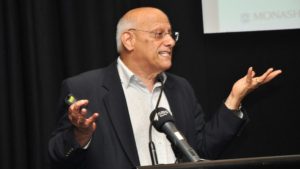Social cohesion stays strong but discrimination on the rise – Scanlon survey
 Strong and stable support for multiculturalism and positive attitudes toward immigration have been maintained in Australia over a decade, according to a new study.
Strong and stable support for multiculturalism and positive attitudes toward immigration have been maintained in Australia over a decade, according to a new study.
The 2017 Mapping Social Cohesion report, produced the Scanlon Foundation and Monash University, shows overwhelming support among Australians for multiculturalism and present levels of immigration
But the survey also shows low levels of trust in government and negative shifts in sentiment about social justice and levels of discrimination.
In its tenth year, and with a collective sample of 42,000 respondents, the Scanlon Survey is the largest of its kind and tracks Australian attitudes on issues including immigration, multiculturalism, discrimination and political trust.
Lead researcher Professor Andrew Markus said the report reinforced Australia’s consistently high level of support for immigration and cultural diversity.
Despite significant demographic change over the decade, including population rise and increased diversity, Australian attitudes have remained, in large measure, stably positive.
The report said 63 per cent of respondents agree or strongly agree that ‘accepting immigrants from many different countries makes Australia stronger’. A minority of Australians (37 per cent) believe Australia’s immigration intake is ‘too high’.
Agreement that ‘multiculturalism has been good for Australia’ remains in the high range of 83-86 per cent, where it has been since the Scanlon Foundation surveys began asking the question in 2013, the report said.
Professor Markus said ten years of surveys showed did demonstrate areas where concerns are increasing among a minority of Australians.
Three quarters (75 per cent) of Australians now agree that Australia is a land of opportunity where hard work is rewarded, down from 81 per cent in 2007, he said.
The percentage of Australians who expected their lives to be worse in three or four years has almost doubled over the decade, from 11 per cent in 2007 to 19 per cent in 2017.
Those reporting discrimination on the basis of their skin colour, ethnic origin or religion more than doubled, from nine per cent to 20 per cent.
When results were analysed alongside the 2016 Australian census, Professor Markus said further insights emerged.
“There is evidence of increasing geographical concentration of overseas-born populations, particularly in Melbourne and Sydney, bringing into question whether past patterns of integration are continuing,” he said.
“There are continuing relatively high levels of negative feeling towards Muslims, and a close examination of survey responses indicates an increase, albeit of less than ten percentage points, of those indicating strong negative views.
“The perceived failures of Australian democracy and the increasing support for minor parties were developments of potential major consequence for the country,” Professor Markus said.
“Within the mainstream – among supporters of the Liberal, National and Labor parties – there is recognition of problems with Australian democracy, but radical change does not gain majority endorsement,” Professor Markus said.
He pointed to misleading claims about support for diversity and immigration, saying there existed the temptation for mainstream political parties to attract certain parts of the electorate by demonising newcomers to Australia and blaming migration on their economic problems.
Prof Markus said concern over the economy remained the top ranking ‘most important problem facing Australia today’ by a wide margin, although it has dropped to 26 per cent, down from 36 per cent in 2013.
Poor quality of government is the second – ranked issue at ten per cent.
He said three issues have undergone substantial change over the last decade: Concerns of environment and climate change have dropped to 7 per cent following a peak of 18 per cent in 2011; concern over asylum seekers and boat arrivals have dropped from 12 per cent in 2012-13 to just two per cent in 2017, and; concerns of terrorism and national security are at 7 per cent, compared to just one per cent in 2014.
AMES Australia CEO Cath Scarth said the overall findings were positive although there had been an increase in people reporting discrimination on the basis of race or religion.
“We at AMES Australia are pleased to see the continuing high levels of support in the broader Australian society for multiculturalism and migration,” Ms Scarth said.
“We note the study reports higher levels racial discrimination but this may be because people feel more empowered to stand up for themselves and speak out,” she said.
“We are seeing more instances of people speaking out about sexual discrimination and harassment and worker exploitation. So, it may be a positive thing that people feel more willing to speak up about acts of racial discrimination,” Ms Scarth said.
She said strong leadership in government and in the community was needed to protect multiculturalism.
“We need strong leadership in government and in the community to protect the high levels of social cohesion we have achieved and to bolster the successful brand of multiculturalism we have built in this country,” Ms Scarth said.
Laurie Nowell
AMES Australia Senior Journalist












